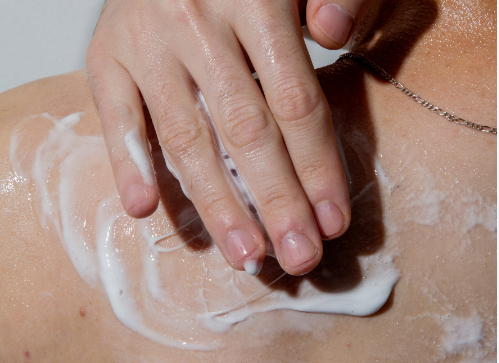Body acne, just like facial acne, can be a frustrating and embarrassing condition to deal with. Whether it’s on your back, chest, shoulders, or elsewhere, those pesky pimples can affect your self-confidence and overall well-being. However, with the right approach and consistent care, you can effectively manage and reduce body acne. Here are 10 tips to help you get rid of them:
- Keep Your Skin Clean: Good hygiene is crucial for preventing and treating body acne. Take regular showers, especially after sweating, and use a gentle cleanser to wash your skin. Avoid harsh soaps or scrubbing too vigorously, as this can irritate the skin and exacerbate acne.
- Exfoliate Regularly: Exfoliation helps remove dead skin cells and unclog pores, preventing acne breakouts. Use a gentle exfoliating scrub or brush to exfoliate your body 2-3 times a week. Be careful not to overdo it, as excessive exfoliation can irritate the skin.
- Choose Non-Comedogenic Products: When selecting skincare products, opt for non-comedogenic or oil-free formulas that won’t clog pores. Look for labels that indicate the product is suitable for acne-prone skin.
- Moisturize: Even if you have oily or acne-prone skin, moisturizing is essential to maintain skin health and prevent dryness. Choose a lightweight, oil-free moisturizer that won’t clog pores. Hydrated skin is less likely to produce excess oil, which can contribute to acne.
- Wear Breathable Fabrics: Tight clothing made of synthetic materials can trap sweat and bacteria against the skin, leading to acne breakouts. Opt for loose-fitting, breathable fabrics like cotton that allow your skin to breathe and prevent sweat buildup.
- Shower After Exercise: Sweat and dirt can accumulate on your skin during workouts, increasing the risk of body acne. Always shower promptly after exercising to remove sweat, bacteria, and impurities from your skin.
- Avoid Friction: Friction from tight clothing, backpack straps, or rough towels can irritate the skin and worsen acne. Wear loose clothing, especially during workouts, and pat your skin dry gently after showering instead of rubbing vigorously.
- Limit Sun Exposure: While sun exposure can temporarily improve acne by drying out pimples, it can also damage the skin and lead to long-term problems like hyperpigmentation and premature aging. Use a non-comedogenic sunscreen to protect your skin from harmful UV rays.
- Try Over-the-Counter Treatments: Over-the-counter acne treatments containing ingredients like benzoyl peroxide, salicylic acid, or sulfur can help reduce inflammation and unclog pores. Apply these treatments directly to affected areas according to the product instructions.
- Consult a Dermatologist: If over-the-counter treatments aren’t effective in controlling your body acne, or if you have severe or persistent breakouts, consider consulting a dermatologist. They can prescribe prescription-strength medications or recommend professional treatments like chemical peels or laser therapy.
In conclusion, managing body acne requires a combination of good hygiene, skincare, and lifestyle habits. By following these tips and being consistent with your routine, you can effectively treat and prevent body acne, restoring clear and healthy skin. Remember to be patient and gentle with your skin, and don’t hesitate to seek professional help if needed.
